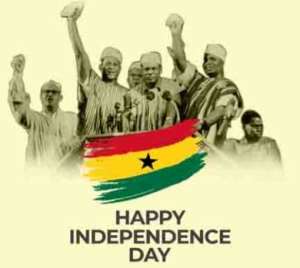
Ghana’s Independence Day, celebrated annually on March 6, is a momentous occasion that commemorates the nation’s liberation from colonial rule. It is a day to honor the sacrifices of those who fought for freedom, led by the visionary Osagyefo Dr. Kwame Nkrumah, and to reflect on the journey of a nation that became the first sub-Saharan African country to gain independence in 1957. However, as Ghana marks its 68th Independence Day, the celebration takes on a new tone—one of austerity, responsibility, and a renewed focus on engaging the youth in nation-building.
A HISTORICAL PERSPECTIVE
On March 6, 1957, Ghana declared itself “FREE FOREVER” from British colonial rule, with Dr. Kwame Nkrumah proclaiming the dawn of a new African capable of managing its own affairs. The iconic Black Star Square became a symbol of hope, unity, and liberation, as the nation embraced its newfound sovereignty. Over the decades, Independence Day has been celebrated with grandeur, featuring parades, cultural displays, and military precision.
However, in recent years, the economic realities facing Ghana have necessitated a shift in how this historic day is observed. President John Dramani Mahama’s administration has introduced austerity measures to ensure that the celebrations remain meaningful while reflecting the nation’s fiscal constraints.
AUSTERITY MEASURES: Balancing Pride with Prudence
This year’s Independence Day celebrations have been scaled down significantly, with the event being held at the Jubilee House instead of the traditional Black Star Square or regional capitals. The decision to reduce costs is a response to Ghana’s economic challenges, including high inflation, a depreciating currency, and growing public debt.
In 2024, the Independence Day celebrations in Koforidua cost the nation GH¢15 million. This year, the budget has been slashed by 90%, with the event costing only GH¢1.5 million. The number of participants has also been reduced from over 3,600 contingents to just 500, including schoolchildren and security personnel. These measures underscore the government’s commitment to fiscal responsibility while preserving the significance of the day.
ENGAGING THE YOUTH: A Vision for the Future
President Mahama’s administration has also emphasized the importance of involving the youth in Independence Day activities. Beyond parades and ceremonies, the day is being reimagined as an opportunity for civic engagement and environmental stewardship.
PROPOSED ACTIVITIES INCLUDE:
1. Tree Planting Initiatives: Encouraging schoolchildren and youth groups to plant trees as a symbol of growth, sustainability, and a commitment to combating climate change.
2. Sanitation Drives: Mobilizing communities to clean their surroundings, promoting hygiene and environmental consciousness.
3. Educational Competitions: Hosting debates, quizzes, and essay contests to deepen the youth’s understanding of Ghana’s history and inspire a sense of patriotism.
4. Community Service Projects: Engaging young people in activities that address local challenges, fostering a spirit of volunteerism and responsibility.
These initiatives align with the Independence Day theme, “Reflect, Review, and Reset,” which calls on Ghanaians to assess their progress and chart a renewed path toward prosperity.
A LEGACY OF RESPONSIBILITY
The shift in how Ghana celebrates Independence Day reflects a broader cultural transformation. It is a recognition that national pride is not measured by the grandeur of ceremonies but by the collective actions of citizens to build a better future. By involving the youth in meaningful activities, the government is investing in the next generation of leaders who will carry forward the ideals of unity, resilience, and determination.
As Ghana commemorates 68 years of independence, the nation stands at a crossroads. The challenges are significant, but so are the opportunities. By embracing fiscal prudence, environmental responsibility, and youth engagement, Ghana can honor its past while building a brighter, more inclusive future.
Long live Ghana! Happy Independence Day!
Chinua Achebe Quotation
“Until the lions have their own historians, the history of the hunt will always glorify the hunter.”
– This quote from Chinua Achebe underscores the importance of owning and telling our own stories. As Ghana reflects on its independence, it serves as a reminder to celebrate and preserve the narratives of those who fought for freedom, ensuring that their sacrifices are honored and remembered through the lens of truth and pride.
Fusaini Isah’s Dagomba Wise Proverb
“When the drum beats, it is not for one person to dance alone.”
– This Dagomba proverb highlights the value of unity and collective effort. It resonates with the Independence Day theme of “Reflect, Review, and Reset,” encouraging Ghanaians to come together as one people to build a stronger, more inclusive nation.
Biblical Quotation
“How good and pleasant it is when God’s people live together in unity!” – Psalm 133:1
– This verse emphasizes the beauty and strength of unity, a core principle that has defined Ghana’s national identity. It inspires citizens to work together harmoniously, fostering peace and progress as they move forward.
International Quotation
“National pride is to countries what self-respect is to individuals: a necessary condition for self-improvement.” – Richard Rorty
– This quote reflects the importance of national pride as a foundation for growth and development. It aligns with Ghana’s aspirations to build a prosperous future while honoring the sacrifices of the past.
These quotations collectively inspire reflection, unity, and a renewed commitment to Ghana’s progress. They beautifully complement the Independence Day message and its call to action.
Retired Senior Citizen
Teshie-Nungua


